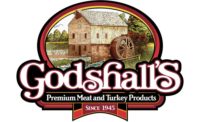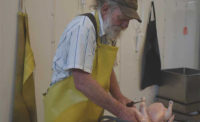Morrilton Packing, better known as Petit Jean Meats, is such an institution that generations of Arkansans have grown up on its products. It’s so popular that restaurants all over the state proudly tout Petit Jean ham, bacon or sausages on their menu. It’s been so successful that it’s outlasted all the competition to become the only privately owned red meat processor in the state.
None of these accolades suggest that Petit Jean Meats is a museum piece. Though the company is nearing its 90th anniversary, it continues to expand and innovate. The Ruff family, representing the third and fourth generations of family ownership, has worked to modernize its processes and grow its business from Arkansas to the rest of the country.
“We have a very loyal following,” explains David Ruff, president and CEO. “It’s not the highest priced out there, but it’s in the upper third. If you want cheap, you don’t buy our product, but if you want something good, you’ll buy our product.”
Ruff has worked at Petit Jean Meats since 1984, and one of his first tasks was to redesign the company’s Morrilton headquarters. Three of his children, Edward (Vice President/Director of Operations), Charles (Plant Manager) and Travis (Director of Maintenance) are following in the family tradition by working in the company. They have added their own expertise in the mix and keep the company operating efficiently and releasing new products into the marketplace.
Edward says that the company is working on several new products for the heat-and-eat market as well as expanding on some of its most popular products. Product development involves a simple but effective quality control test — the company’s 70 employees.
“A lot of times we’ll make something and set it in the break room. If it’s still there later in the afternoon, then you know you might need to start over. If it’s gone after the first break, then you’re onto something!” he says.
With its long history, Petit Jean Meats has become a staple in the retail and foodservice markets in Arkansas. It produces a variety of hams — bone-in, boneless, spiral sliced — and bacon, as well as hot dogs, sausages and lunch meats. The popularity of those items has helped it weather the increasing consolidation in the retail market in Arkansas.
“There are several independent groups in Arkansas with anywhere from two stores up to eight stores, but 80 percent of the grocery business in Arkansas is owned by three companies,” Edward adds.
Apart from the retail and foodservice sectors, Petit Jean Meats has developed a growing mail order business. The company sends out catalogs and has an e-commerce website to showcase its products. Its hams, bacon and variety packages have become popular holiday and corporate gifts.
The evolution into mail order was natural for Petit Jean, as there are plenty of people who grew up on its products before moving out of state. The original inspiration for starting a mail-order business came in the mid-1980s, when the company got a phone call from a woman from Wisconsin.
“She had been to Hot Springs three years prior, and there is a restaurant there that buys our ham,” David recalls. “She had eaten there, and she said for three years she tried to find a ham as good as that ham, and everything she bought didn’t measure up.”
She didn’t recall the name of the restaurant, so she eventually called the Hot Springs Chamber of Commerce, which gave her the name of the restaurant. She called the restaurant and got the name of the meat market that sold the ham, and then she called the meat market and finally got connected to Petit Jean Meats.
“We sent her a ham for Christmas and Easter for years. That was the accidental beginning of mail order,” David says.
From that modest beginning, Petit Jean’s mail order business has taken off. Edward says that the company now ships more than 20,000 packages during the final two months of the year.
“It went from hauling packages in the back of a pickup to a UPS hub and shipping it, to where they line up trailers here,” he says with a laugh.
A good foundation
Petit Jean Meats’ 65,000-square-foot plant may not be brand new — it was finished in 1987 — but it has been designed and reconfigured to meet the company’s changing needs. It also has been BRC certified for the last six years. David Ruff spent time working for two large food companies before he came back to the family business, and he used his experience to give Petit Jean a first-class facility.
“That was what allowed us to build this plant, because I was able to see things that I didn’t know existed,” he says of his earlier experiences.
He worked with a contractor who had done work in food plants, so he knew the specifics of a food production facility.
“We spent three nights a week for a year on his drafting table before we ever started building it. We took the good parts from places we’ve been involved in and eliminated the bad parts,” David explains.
Subsequent changes to the plant came when the company gave up hog slaughtering — the best decision they ever made, in David’s opinion — and expanded its packaging operations.
Edward was heavily involved in the most recent renovation. Along with picking up some valuable experience as a plumber, welder and electrician, he learned the value of doing dry runs before making any permanent changes to the building. One trick they’ve used often is to make cardboard cutouts of the equipment, lay them out on the floor, and bring in all the peripheral things like buckets, tubs and carts to make sure the process flowed correctly.
“If we didn’t have the actual room the equipment was going in, I taped off a section of floor that was the size of the production room, and then we set up the dummy operation,” he says. “We’d bring in guys on a Saturday and say, ‘I want you to make bologna,’ and we’d do the ‘dance chart’ just to make sure that everything was going to fit.”
Petit Jean’s next goal is to expand further into Texas. It has made inroads with some grocers and school fundraising companies and added a sponsorship with the Dallas Cowboys. Even though that state is filled with meat processors, David believes there is an opportunity for Petit Jean’s high-quality hams, sausages and bacon.










Report Abusive Comment